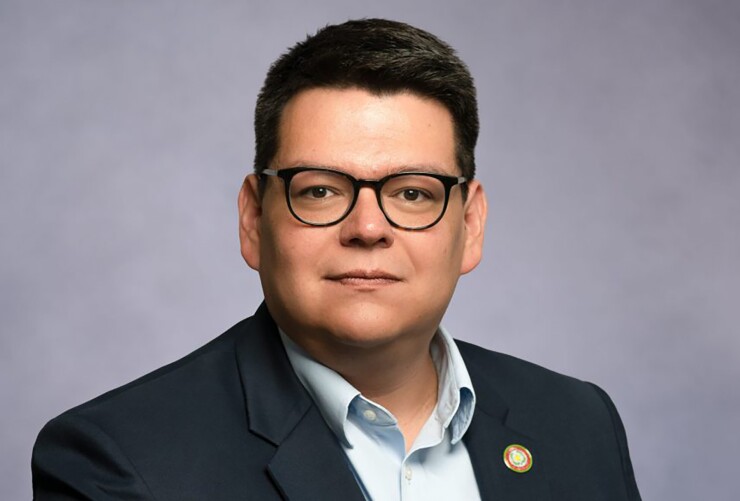The NAFOA, founded as the Native American Finance Officers Association, announced that Cory M. Blankenship will take over the helm as the organization pushes the Tribal Tax & Investment Reform Act, which would free up tribal bond issuance.
"NAFOA has been working with Congresswoman Gwen Moore D-Wisc. and Congressman David Schweikert's R-Ariz. offices to help educate both Indian Country and Congress on the legislation," said Blankenship, of the Eastern Band of Cherokee Indians.
"We are expecting a Senate version to be forthcoming soon and expect to see additional cosponsors now that the August recess is over."

Blankenship's new role will start Sept. 30 when he takes over the position from Susan Masten (Yurok Tribe), who's been serving as interim executive director since June 2023. The group was founded in 1982, and its membership includes representatives from over 170 tribes.
"We couldn't be more thrilled that Cory has decided to bring his talents to NAFOA," said Chairman Rodney Butler (Mashantucket Pequot Tribal Nation), president of the NAFOA board of directors.
"His extensive background in tribal finance and governance, combined with his experience with nonprofits, positions him to effectively lead NAFOA."
The Tribal Tax & Investment Reform Act was re-introduced to the House in May 2024, but variations of the legislation have been bouncing around since the 113th Congress during President Obama's second term.
The bill is targeted at amending the Internal Revenue Code regulating the cap on Private Activity Bonds while enabling "tribal governments to issue private activity bonds for economic development purposes like state and local governments can."
Per the proposed legislation, "this bill places tribes on equal footing with state and local governments with respect to select excise taxes, including manufacturing and communication excise taxes."
Supporters of the bill argue it's needed to correct a convoluted Internal Revenue Service ruling dating back to 2006 that attempts to clarify the parameters of an "essential government function," as related to bond issuance.
The IRS states that an essential government function "does not include any function that is not customarily performed by state and local governments with general taxing powers."
The regulation was originally designed to stop tribes from exploiting tax exemptions that are unavailable to states but debate has been raging ever since over the meaning of "customarily."
Opponents of the regulation maintain that it limits tribes' abilities to issue tax exempt bonds to fund infrastructure and housing projects.
The legislation is also looking to change the rules on Low-Income Tax Credits, a fundamental chip in the capital stack needed to build affordable housing communities.
Per the proposed bill, "The LIHTC program provides tax incentives to developers to create affordable housing, but credits are often unavailable to tribes. This section modifies the definition of 'difficult development area' to include an Indian area for the purposes of determining eligible basis thereby explicitly including tribes in the LIHTC program criteria."
According to Blankenship, NAFOA has created a working group of tribal leaders, tax and business experts, and Congressional staff that meets every other week to discuss the legislation and how to help move it forward.
Blankenship has also served as Community Investment Officer at the Dogwood Health Trust and was the Secretary of the Treasury for the Eastern Band of Cherokee Indians for six years.
He identifies his number one priority in his new role as "supporting efforts to ensure tribal nations and tribal leaders have a voice in federal policy that impacts their communities, allowing them to create a path to building stronger tribal economies."





